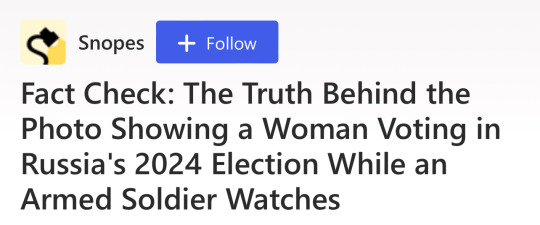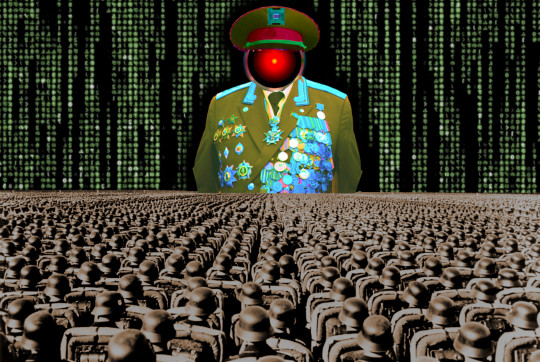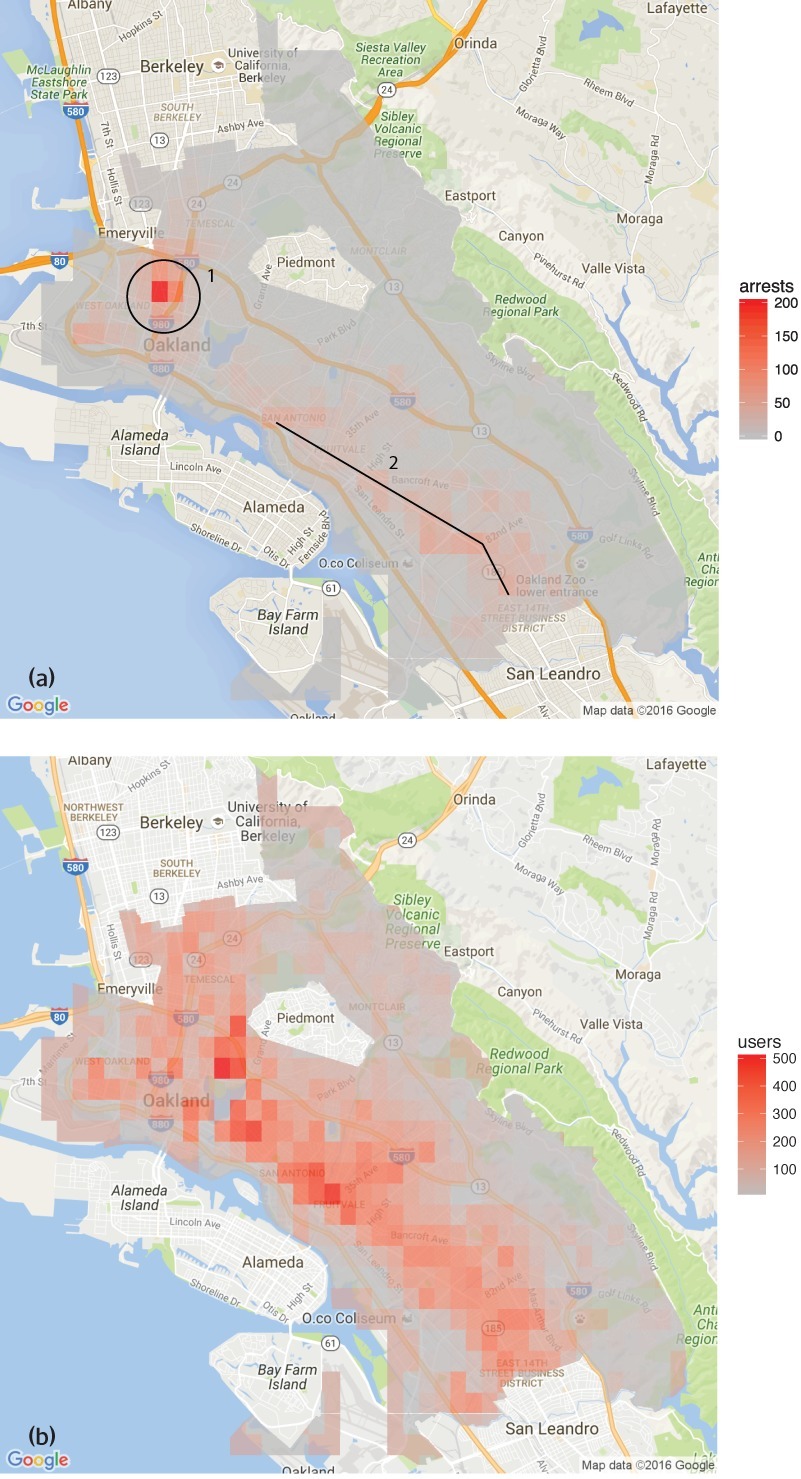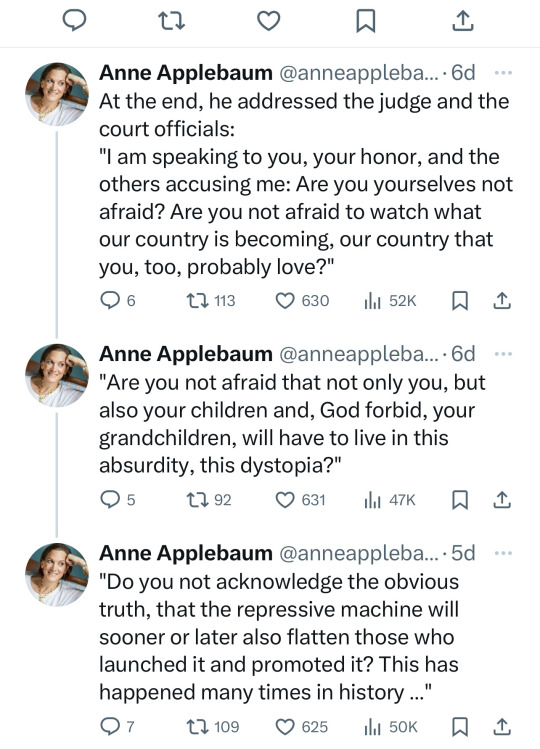#authoritarianism
Text

#this is like 9/11 all over again#gaza genocide#tw murder#tw death#ethnic cleansing#palestinian genocide#genocide joe#state terrorism#islamphobia#arab americans#media suppression#freedom of speech#human rights#us politics#white supremacy#journalism#free palestine#fascism#authoritarianism#knee of huss
11K notes
·
View notes
Text
Thinkpieces about why people seem to become more authoritarian as they get older tend to focus on neuroscience and survivorship bias and such, but based on my experience in various activist communities, I think a big piece of the puzzle that these sorts of discussions often overlook is that a large chunk of people just never had any principled objection to authoritarianism in the first place.
It's easy to talk about fighting the power when you're under the boot, but when some folks get hold of any sort of power or authority for themselves and sticking it to the Man is no longer a proposition with no perceived downsides, they start backpedalling in a real hurry. Power didn't corrupt them. Nothing changed about their politics. Their commitment to anti-authoritarianism was only ever as strong as their perception that it personally benefited them.
(You absolutely can't tell who they are just from looking at them, either; a person can use all the right jargon and support all the right causes and show up at all the right protests, yet the moment their private emotional calculus determines, rightly or wrongly, that they have more to gain by putting a boot on your neck than by lifting it off, watch out!)
4K notes
·
View notes
Text
I remember when my mother told me "there's a lot of weird people out there" as a way of telling me to be careful.
But that didn't help at all, because it's not weird people who are dangerous.
The most dangerous people are those who take advantage of society's expectations, those who act like it's rude to set boundaries, and those who make sure they have as much of a power advantage as possible.
But that describes a very large percentage of authority figures. In order to teach me the truth about who's dangerous, she would have had to teach me that dangerous people have very similar patterns as people who she demanded that I respect.
1K notes
·
View notes
Text

#ethics#critical thinking#capitalism#society#economics#poverty#homelessness#class struggle#inequality#class war#corporatism#working class#class warfare#authoritarianism#communism#anarchism#socialist#antifascist#anarchocommunism#revolution
6K notes
·
View notes
Text
Scary Project 2025 and its authoritarian backers have marching orders ready for the next conservative President that gets elected (while probably losing the popular vote again as usual).
#politics#project 2025#coyote annie#republicans#authoritarianism#anti democratic#authoritarian#fascisim#theocracy#conservatives#focus on your own fucking family
832 notes
·
View notes
Text










RUSSIA’S SHAM ELECTIONS, where people are “helped” by armed soldiers who check to ensure they vote correctly—or else.
Does this look like they are helping to conduct a fair, peaceful and democratic election process? Or does it look like repressed voters under duress, who are being forced to vote for Putin under threat of armed Russian soldiers? (source) (source) (source)
#politics#ukraine#russia#sham elections#russian invasion of ukraine#russian fascism ☭#russia is a terrorist state#vladimir putin is a war criminal#authoritarianism#authoritarian dictatorships#russian colonialism#donetsk#sievierodonetsk#russian election 2024#russian imperialism#settler colonialism#settler violence#russian elections#russian sham elections
341 notes
·
View notes
Text

746 notes
·
View notes
Text
The surprising truth about data-driven dictatorships

Here’s the “dictator’s dilemma”: they want to block their country’s frustrated elites from mobilizing against them, so they censor public communications; but they also want to know what their people truly believe, so they can head off simmering resentments before they boil over into regime-toppling revolutions.
These two strategies are in tension: the more you censor, the less you know about the true feelings of your citizens and the easier it will be to miss serious problems until they spill over into the streets (think: the fall of the Berlin Wall or Tunisia before the Arab Spring). Dictators try to square this circle with things like private opinion polling or petition systems, but these capture a small slice of the potentially destabiziling moods circulating in the body politic.
Enter AI: back in 2018, Yuval Harari proposed that AI would supercharge dictatorships by mining and summarizing the public mood — as captured on social media — allowing dictators to tack into serious discontent and diffuse it before it erupted into unequenchable wildfire:
https://www.theatlantic.com/magazine/archive/2018/10/yuval-noah-harari-technology-tyranny/568330/
Harari wrote that “the desire to concentrate all information and power in one place may become [dictators] decisive advantage in the 21st century.” But other political scientists sharply disagreed. Last year, Henry Farrell, Jeremy Wallace and Abraham Newman published a thoroughgoing rebuttal to Harari in Foreign Affairs:
https://www.foreignaffairs.com/world/spirals-delusion-artificial-intelligence-decision-making
They argued that — like everyone who gets excited about AI, only to have their hopes dashed — dictators seeking to use AI to understand the public mood would run into serious training data bias problems. After all, people living under dictatorships know that spouting off about their discontent and desire for change is a risky business, so they will self-censor on social media. That’s true even if a person isn’t afraid of retaliation: if you know that using certain words or phrases in a post will get it autoblocked by a censorbot, what’s the point of trying to use those words?
The phrase “Garbage In, Garbage Out” dates back to 1957. That’s how long we’ve known that a computer that operates on bad data will barf up bad conclusions. But this is a very inconvenient truth for AI weirdos: having given up on manually assembling training data based on careful human judgment with multiple review steps, the AI industry “pivoted” to mass ingestion of scraped data from the whole internet.
But adding more unreliable data to an unreliable dataset doesn’t improve its reliability. GIGO is the iron law of computing, and you can’t repeal it by shoveling more garbage into the top of the training funnel:
https://memex.craphound.com/2018/05/29/garbage-in-garbage-out-machine-learning-has-not-repealed-the-iron-law-of-computer-science/
When it comes to “AI” that’s used for decision support — that is, when an algorithm tells humans what to do and they do it — then you get something worse than Garbage In, Garbage Out — you get Garbage In, Garbage Out, Garbage Back In Again. That’s when the AI spits out something wrong, and then another AI sucks up that wrong conclusion and uses it to generate more conclusions.
To see this in action, consider the deeply flawed predictive policing systems that cities around the world rely on. These systems suck up crime data from the cops, then predict where crime is going to be, and send cops to those “hotspots” to do things like throw Black kids up against a wall and make them turn out their pockets, or pull over drivers and search their cars after pretending to have smelled cannabis.
The problem here is that “crime the police detected” isn’t the same as “crime.” You only find crime where you look for it. For example, there are far more incidents of domestic abuse reported in apartment buildings than in fully detached homes. That’s not because apartment dwellers are more likely to be wife-beaters: it’s because domestic abuse is most often reported by a neighbor who hears it through the walls.
So if your cops practice racially biased policing (I know, this is hard to imagine, but stay with me /s), then the crime they detect will already be a function of bias. If you only ever throw Black kids up against a wall and turn out their pockets, then every knife and dime-bag you find in someone’s pockets will come from some Black kid the cops decided to harass.
That’s life without AI. But now let’s throw in predictive policing: feed your “knives found in pockets” data to an algorithm and ask it to predict where there are more knives in pockets, and it will send you back to that Black neighborhood and tell you do throw even more Black kids up against a wall and search their pockets. The more you do this, the more knives you’ll find, and the more you’ll go back and do it again.
This is what Patrick Ball from the Human Rights Data Analysis Group calls “empiricism washing”: take a biased procedure and feed it to an algorithm, and then you get to go and do more biased procedures, and whenever anyone accuses you of bias, you can insist that you’re just following an empirical conclusion of a neutral algorithm, because “math can’t be racist.”
HRDAG has done excellent work on this, finding a natural experiment that makes the problem of GIGOGBI crystal clear. The National Survey On Drug Use and Health produces the gold standard snapshot of drug use in America. Kristian Lum and William Isaac took Oakland’s drug arrest data from 2010 and asked Predpol, a leading predictive policing product, to predict where Oakland’s 2011 drug use would take place.

[Image ID: (a) Number of drug arrests made by Oakland police department, 2010. (1) West Oakland, (2) International Boulevard. (b) Estimated number of drug users, based on 2011 National Survey on Drug Use and Health]
Then, they compared those predictions to the outcomes of the 2011 survey, which shows where actual drug use took place. The two maps couldn’t be more different:
https://rss.onlinelibrary.wiley.com/doi/full/10.1111/j.1740-9713.2016.00960.x
Predpol told cops to go and look for drug use in a predominantly Black, working class neighborhood. Meanwhile the NSDUH survey showed the actual drug use took place all over Oakland, with a higher concentration in the Berkeley-neighboring student neighborhood.
What’s even more vivid is what happens when you simulate running Predpol on the new arrest data that would be generated by cops following its recommendations. If the cops went to that Black neighborhood and found more drugs there and told Predpol about it, the recommendation gets stronger and more confident.
In other words, GIGOGBI is a system for concentrating bias. Even trace amounts of bias in the original training data get refined and magnified when they are output though a decision support system that directs humans to go an act on that output. Algorithms are to bias what centrifuges are to radioactive ore: a way to turn minute amounts of bias into pluripotent, indestructible toxic waste.
There’s a great name for an AI that’s trained on an AI’s output, courtesy of Jathan Sadowski: “Habsburg AI.”
And that brings me back to the Dictator’s Dilemma. If your citizens are self-censoring in order to avoid retaliation or algorithmic shadowbanning, then the AI you train on their posts in order to find out what they’re really thinking will steer you in the opposite direction, so you make bad policies that make people angrier and destabilize things more.
Or at least, that was Farrell(et al)’s theory. And for many years, that’s where the debate over AI and dictatorship has stalled: theory vs theory. But now, there’s some empirical data on this, thanks to the “The Digital Dictator’s Dilemma,” a new paper from UCSD PhD candidate Eddie Yang:
https://www.eddieyang.net/research/DDD.pdf
Yang figured out a way to test these dueling hypotheses. He got 10 million Chinese social media posts from the start of the pandemic, before companies like Weibo were required to censor certain pandemic-related posts as politically sensitive. Yang treats these posts as a robust snapshot of public opinion: because there was no censorship of pandemic-related chatter, Chinese users were free to post anything they wanted without having to self-censor for fear of retaliation or deletion.
Next, Yang acquired the censorship model used by a real Chinese social media company to decide which posts should be blocked. Using this, he was able to determine which of the posts in the original set would be censored today in China.
That means that Yang knows that the “real” sentiment in the Chinese social media snapshot is, and what Chinese authorities would believe it to be if Chinese users were self-censoring all the posts that would be flagged by censorware today.
From here, Yang was able to play with the knobs, and determine how “preference-falsification” (when users lie about their feelings) and self-censorship would give a dictatorship a misleading view of public sentiment. What he finds is that the more repressive a regime is — the more people are incentivized to falsify or censor their views — the worse the system gets at uncovering the true public mood.
What’s more, adding additional (bad) data to the system doesn’t fix this “missing data” problem. GIGO remains an iron law of computing in this context, too.
But it gets better (or worse, I guess): Yang models a “crisis” scenario in which users stop self-censoring and start articulating their true views (because they’ve run out of fucks to give). This is the most dangerous moment for a dictator, and depending on the dictatorship handles it, they either get another decade or rule, or they wake up with guillotines on their lawns.
But “crisis” is where AI performs the worst. Trained on the “status quo” data where users are continuously self-censoring and preference-falsifying, AI has no clue how to handle the unvarnished truth. Both its recommendations about what to censor and its summaries of public sentiment are the least accurate when crisis erupts.
But here’s an interesting wrinkle: Yang scraped a bunch of Chinese users’ posts from Twitter — which the Chinese government doesn’t get to censor (yet) or spy on (yet) — and fed them to the model. He hypothesized that when Chinese users post to American social media, they don’t self-censor or preference-falsify, so this data should help the model improve its accuracy.
He was right — the model got significantly better once it ingested data from Twitter than when it was working solely from Weibo posts. And Yang notes that dictatorships all over the world are widely understood to be scraping western/northern social media.
But even though Twitter data improved the model’s accuracy, it was still wildly inaccurate, compared to the same model trained on a full set of un-self-censored, un-falsified data. GIGO is not an option, it’s the law (of computing).
Writing about the study on Crooked Timber, Farrell notes that as the world fills up with “garbage and noise” (he invokes Philip K Dick’s delighted coinage “gubbish”), “approximately correct knowledge becomes the scarce and valuable resource.”
https://crookedtimber.org/2023/07/25/51610/
This “probably approximately correct knowledge” comes from humans, not LLMs or AI, and so “the social applications of machine learning in non-authoritarian societies are just as parasitic on these forms of human knowledge production as authoritarian governments.”

The Clarion Science Fiction and Fantasy Writers’ Workshop summer fundraiser is almost over! I am an alum, instructor and volunteer board member for this nonprofit workshop whose alums include Octavia Butler, Kim Stanley Robinson, Bruce Sterling, Nalo Hopkinson, Kameron Hurley, Nnedi Okorafor, Lucius Shepard, and Ted Chiang! Your donations will help us subsidize tuition for students, making Clarion — and sf/f — more accessible for all kinds of writers.

Libro.fm is the indie-bookstore-friendly, DRM-free audiobook alternative to Audible, the Amazon-owned monopolist that locks every book you buy to Amazon forever. When you buy a book on Libro, they share some of the purchase price with a local indie bookstore of your choosing (Libro is the best partner I have in selling my own DRM-free audiobooks!). As of today, Libro is even better, because it’s available in five new territories and currencies: Canada, the UK, the EU, Australia and New Zealand!

[Image ID: An altered image of the Nuremberg rally, with ranked lines of soldiers facing a towering figure in a many-ribboned soldier's coat. He wears a high-peaked cap with a microchip in place of insignia. His head has been replaced with the menacing red eye of HAL9000 from Stanley Kubrick's '2001: A Space Odyssey.' The sky behind him is filled with a 'code waterfall' from 'The Matrix.']

Image:
Cryteria (modified)
https://commons.wikimedia.org/wiki/File:HAL9000.svg
CC BY 3.0
https://creativecommons.org/licenses/by/3.0/deed.en
—
Raimond Spekking (modified)
https://commons.wikimedia.org/wiki/File:Acer_Extensa_5220_-_Columbia_MB_06236-1N_-_Intel_Celeron_M_530_-_SLA2G_-_in_Socket_479-5029.jpg
CC BY-SA 4.0
https://creativecommons.org/licenses/by-sa/4.0/deed.en
—
Russian Airborne Troops (modified)
https://commons.wikimedia.org/wiki/File:Vladislav_Achalov_at_the_Airborne_Troops_Day_in_Moscow_%E2%80%93_August_2,_2008.jpg
“Soldiers of Russia” Cultural Center (modified)
https://commons.wikimedia.org/wiki/File:Col._Leonid_Khabarov_in_an_everyday_service_uniform.JPG
CC BY-SA 3.0
https://creativecommons.org/licenses/by-sa/3.0/deed.en
#pluralistic#habsburg ai#self censorship#henry farrell#digital dictatorships#machine learning#dictator's dilemma#eddie yang#preference falsification#political science#training bias#scholarship#spirals of delusion#algorithmic bias#ml#Fully automated data driven authoritarianism#authoritarianism#gigo#garbage in garbage out garbage back in#gigogbi#yuval noah harari#gubbish#pkd#philip k dick#phildickian
825 notes
·
View notes
Text

Background: During adolescence, bullying often has a sexual content. Involvement in bullying as a bully, victim or both has been associated with a range of negative health outcomes. Transgender youth appear to face elevated rates of bullying in comparison to their mainstream peers. However, the involvement of transgender youth as perpetrators of bullying remains unclear in the recent literature.
Objective: The aim of this study was to compare involvement in bullying between transgender and mainstream youth and among middle and late adolescents in a general population sample.
Methods: Our study included 139,829 students in total, divided between a comprehensive school and an upper secondary education sample. Associations between gender identity and involvement in bullying were first studied using cross-tabulations with chi-square statistics. Logistic regression was used to study multivariate associations. Gender identity was used as the independent variable, with cisgender as the reference category. Subjection to and perpetration of bullying were entered each in turn as the dependent variable. Demographic factors, family characteristics, internalizing symptoms, externalizing behaviors, and involvement in bullying in the other role were added as confounding factors. Odds ratios (OR) with 95% confidence intervals (95% CI) are given. The limit for statistical significance was set at p < 0.001.
Results: Both experiences of being bullied and perpetrating bullying were more commonly reported by transgender youth than by cisgender youth. Among transgender youth, all involvement in bullying was more commonly reported by non-binary youth than those identifying with the opposite sex. Logistic regression revealed that non-binary identity was most strongly associated with involvement in bullying, followed by opposite sex identity and cisgender identity. Transgender identities were also more strongly associated with perpetration of bullying than subjection to bullying.
--
Secondly, we found that transgender identity was generally associated with perpetrating bullying and that the association was stronger than that of transgender identity and being bullied. To the best of our knowledge, past research has not examined perpetration of bullying among gender minority youth, thus rendering comparisons to prior research impossible. In a study by Dank et al. (2014), however, it was reported that the few transgender young people in their study were the ones most likely to perpetrate dating violence among their sample.
--
Thirdly, non-binary identity was more strongly associated with involvement in bullying than opposite sex identity. Past research has found elevated rates of being subjected to bullying among youth (Lowry et al., 2020; van Beusekom et al., 2020) and transgender youth (Gower et al., 2018) who perceive themselves as more gender non-conforming (i.e., masculine females or feminine males) than youth with no such perception. Non-binary identifying youth particularly may display gender expression that does not conform to either masculine or feminine roles, and this may make them vulnerable to being bullied either due to simply being different from the mainstream, or as a result of heterosexist control. We found, however, that not only being bullied but also engaging in bullying was even more common among non-binary (perception of gender conforms to both or neither sex or it varies) than among opposite sex identifying youth.
==
"Non-binary" is just a new way to bully other people.
Trying to make people refer to you in stupid, language defying ways, like "schglie/schglem," at the threat of being called a bigot, when you're a completely average man or woman, is the modern day equivalent of making the kids in the playground bow and call you "the god of the jungle gym" at the threat of being beaten up, when you can't actually do that flip from hanging by your knees into a standing position.
When, unlike the playground, society has given you the power to actually carry out that threat, you're not "marginalized," you're the ruling class. (What's that "power plus" arithmetic again?)
Whenever you enter the room, people tense up. And you love it. It's the whole point. Gay and transsexual people just want to blend in, but "nonbinary" is about the opposite. Everybody pays attention to you and you steal the oxygen out of the room. You say it's about "being kind," but you and everyone else knows what you are, which means it's really about being in control, but from a false position of vulnerability.
So it's no wonder it attracts narcissists and bullies. Especially when it's an effort-free way of being celebrated for a month - and on and off the rest of the year for an endless parade of "awareness" days - for being completely unremarkable and average.
Not being a tired stereotype is not an achievement, least of all one that needs to be celebrated.
#non binary#nonbinary#narcissism#narcissistic personality disorder#bullying#trans violence#gender ideology#queer theory#gender identity#religion is a mental illness#authoritarianism
954 notes
·
View notes
Text
"The gerrymandering alone undermines Wisconsin’s status as a democracy. If a majority of the people cannot, under any realistic circumstances, elect a legislative majority of their choosing, then it’s hard to say whether they actually govern themselves."
--Jamelle Bouie, Opinion Columnist, The New York Times

Jamelle Bouie points out the disturbing way that Republicans in Wisconsin have basically destroyed democratic representative government on all levels by:
Creating an unbreakable gerrymander to ensure a Republican legislative majority, even if more people vote for Democrats.
Weakening the power of a Democratic governor,.
Targeting a liberal Wisconsin supreme court justice for removal or suspension so that the state SC won't have the power to rule against gerrymandered districting maps, and won't be able to prevent a 19th century ban on abortion from becoming law.
This is chilling. Below are some excerpts from the column:
For more than a decade, dating back to the Republican triumph in the 2010 midterm elections, Wisconsin Republicans have held their State Legislature in an iron lock, forged by a gerrymander so stark that nothing short of a supermajority of the voting public could break it.
[...]
In 2018, this gerrymander proved strong enough to allow Wisconsin Republicans to win a supermajority of seats in the Assembly despite losing the vote for every statewide office and the statewide legislative vote by 8 percentage points, 54 to 46. No matter how much Wisconsin voters might want to elect a Democratic Legislature, the Republican gerrymander won’t allow them to.
[...]
Using their gerrymandered majority, Wisconsin Republicans have done everything in their power to undermine, subvert or even nullify the public’s attempt to chart a course away from the Republican Party. In 2018, for example, Wisconsin voters put Tony Evers, a Democrat, in the governor’s mansion, sweeping the incumbent, Scott Walker, out of office. immediately, Wisconsin Republicans introduced legislation to weaken the state’s executive branch, curbing the authority that Walker had exercised as governor.
Earlier this year, Wisconsin voters took another step toward ending a decade of Republican minority rule in the Legislature by electing Janet Protasiewicz, a liberal Milwaukee county judge, to the State Supreme Court, in one of the most high-profile and expensive judicial elections in American history.
[...]
“Republicans in Wisconsin are coalescing around the prospect of impeaching a newly seated liberal justice on the state’s Supreme Court,” my newsroom colleague Reid J. Epstein reports. “The push, just five weeks after Justice Janet Protasiewicz joined the court and before she has heard a single case, serves as a last-ditch effort to stop the new 4-to-3 liberal majority from throwing out Republican-drawn state legislative maps and legalizing abortion in Wisconsin.”
Republicans have more than enough votes in the Wisconsin State Assembly to impeach Justice Protasiewicz and just enough votes in the State Senate — a two-thirds majority — to remove her. But removal would allow Governor Evers to appoint another liberal jurist, which is why Republicans don’t plan to convict and remove Protasiewicz. If, instead, the Republican-led State Senate chooses not to act on impeachment, Justice Protasiewicz is suspended but not removed. The court would then revert to a 3-3 deadlock, very likely preserving the Republican gerrymander and keeping a 19th-century abortion law, which bans the procedure, on the books.
If successful, Wisconsin Republicans will have created, in effect, an unbreakable hold on state government. With their gerrymander in place, they have an almost permanent grip on the State Legislature, with supermajorities in both chambers. With these majorities, they can limit the reach and power of any Democrat elected to statewide office and remove — or neutralize — any justice who might rule against the gerrymander.
[color/emphasis added[

"It’s that breathtaking contempt for the people of Wisconsin — who have voted, since 2018, for a more liberal State Legislature and a more liberal State Supreme Court and a more liberal governor, with the full powers of his office available to him — that makes the Wisconsin Republican Party the most openly authoritarian in the country."
--Jamelle Bouie, Opinion Columnist, The New York Times
[edited]
#wisconsin#republican party#authoritarianism#one party rule#disrespect for we the people#gerrymandering#weakening the power of a democratic governor#political removal of a newly elected state supreme court justice#jamelle bouie#the new york times
426 notes
·
View notes
Text

212 notes
·
View notes
Text
You know maybe the horseshoe theory would've been abandoned long ago if certain self-proclaimed "leftists"* weren't so hell-bent to prove it right every five seconds.
(* they're about as much "leftists" as terfs are "feminists")
#tankies#i would like it not to be true as well#but if it walks like a duck and quacks like a duck etcetc.#leftist antisemitism#authoritarian left#authoritarianism#horseshoe theory#🧲#practically a circle these days
169 notes
·
View notes
Text

#hillary clinton#donald trump#maga#elections have consequences#political opinion#2016 election#democratic party#voter engagement#political consequences#current events#genocide#authoritarianism#political polarization#israel#gaza#gaza strip#palestine#free palestine#anti-semitic#islamophobia#zionism#alwaysbewoke
99 notes
·
View notes
Quote
None of the nation’s front pages blared ‘Trump Suggests That Top General Deserves Execution’ or ‘Former President Accuses General of Treason.’ Instead, the post barely made the news. Most Americans who don’t follow Trump on social media probably don’t even know it happened.
Brian Klass in The Atlantic
303 notes
·
View notes
Text

#ben shapiro#fuck ben shapiro#current events#social justice#human rights#tiktok#tiktok ban#free palestine#freepalastine🇵🇸#from the river to the sea palestine will be free#fuck israel#anti zionisim#authoritarianism#totalitarianism#israel occupation#israeli war crimes#government corruption#free gaza#gaza genocide#palestine#gaza#fuck conservatives#israel is a terrorist state#palestine 🇵🇸#tiktok mention#political#political posting#politics#us politics#american politics
91 notes
·
View notes
Text


“This brutal war is not only mass murder of people and destruction of the infrastructure, economy, and cultural sites of Ukraine, but also a severe blow to the future of Russia, a country that is now pushed back into totalitarianism, but this time into a fascist totalitarianism.
We are being punished for daring to criticize authority.” —Oleg Orlov
#politics#russia#ukraine#oleg orlov#russian dissidents#🇺🇦#russia is a terrorist state#russian repression#war crimes#totalitarianism#vladimir putin is a war criminal#russian invasion of ukraine#authoritarianism#russian fascism#☭#fascisim#russian fascism ☭#memorial center for human rights
213 notes
·
View notes